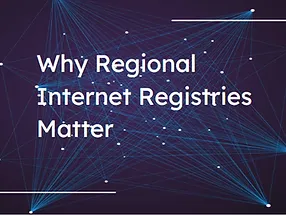
How RIRs Bridge the Digital Divide Across the World
The Internet serves as the massive network that allows everyone in the world, wherever they are, to connect with the rest of the planet. Behind the scenes, Regional Internet Registries (RIRs) play a pivotal role in allocating and distributing IP addresses.
Table of Contents
ToggleWithout IP addresses, this seamless connectivity across diverse regions cannot happen.
The Five RIRs
There are five Regional Internet Registries, each assigned a distinct geographic domain:
1. American Registry for Internet Numbers (ARIN):
ARIN administers Internet addresses and domains for the United States and Canada; plus, many islands in the Caribbean and North Atlantic.
2. Réseaux IP Européens Network Coordination Centre (RIPE NCC)
RIPE NCC is entrusted with the responsibility of managing Internet addresses and domains across Europe, the Middle East, and Central Asia. RIPE NCC is distinct from RIPE (Réseaux IP Européens), which is a community dedicated to the technical development of the Internet in Europe.
3. Asia-Pacific Network Information Centre (APNIC)
APNIC manages Internet resources in the Asia-Pacific region.
4. Latin American and Caribbean Internet Address Registry (LACNIC)
LACNIC is the steward of Internet resources for Latin America and the Caribbean. However, it is important to note that a different organization manages IP allocation for certain countries. For instance, Internet Addresses and Resources Mexico (IAR Mexico) manages Internet assets for Mexico. In Brazil, it is Reistre o Dominio.
5. African Network Information Centre (AFRINIC):
AFRINIC serves the entire African continent.
The Need for a Fair and Equitable Allocation
With the huge growth of online users, the demand for IP addresses has reached unforeseen levels. However, the finite nature of the IPv4 addressing system has posed a challenge: how can we distribute IP addresses fairly across different countries?
That’s where Regional Internet Registries (RIR) come in. RIRs manage Internet resources like IP addresses and autonomous number systems. They are responsible for distributing IP resources based on the needs of their customers.
To accomplish their mission, the five RIRs unite under the umbrella of the Number Resource Organization (NRO). NRO was established in 2003 as a coordinating body for all RIRs.
Each RIR is represented in NRO’s executive council by one of their respective members.
The Role of RIRs
Contrary to popular belief, RIRs do not own Internet assets on their own. Instead, they get these IP assets from the Internet Assigned Numbers Authority (IANA).
RIRs are record-keepers and are entrusted to distribute Internet resources fairly — based on the demonstrated needs of the organization that operate within their region.
Below are the core functions of RIRs, which demonstrate their importance to Internet stability:
- Distribute Internet number resources.
- Maintain routing registries and WhoIs.
- Provide the ability to identify a domain name based on its IP address (also known as reverse DNS).
- Support the improvement of Internet infrastructure by working with Internet service providers (ISPs) and other RIRs.
- Facilitate policies that can improve Internet connectivity.
Threats to RIR Management
RIRs are non-profit organizations that are independent and have no government oversight. How an RIR is run is beyond the scrutiny and regulation of the government (except in cases where blatant corruption and abuse of power are present).
Being independent, RIRs can be susceptible to mismanagement by the people who lead them. Moreover, there is no government rule that can force RIRs to be transparent about their decision-making processes.
While RIRs are important, they can also be vulnerable to corrupt leadership. It is up to the members of the Internet community to be vigilant in making RIRs accountable.
NRS is committed to the fight for a better Internet. Join us to make the vision of a free Internet a reality.



